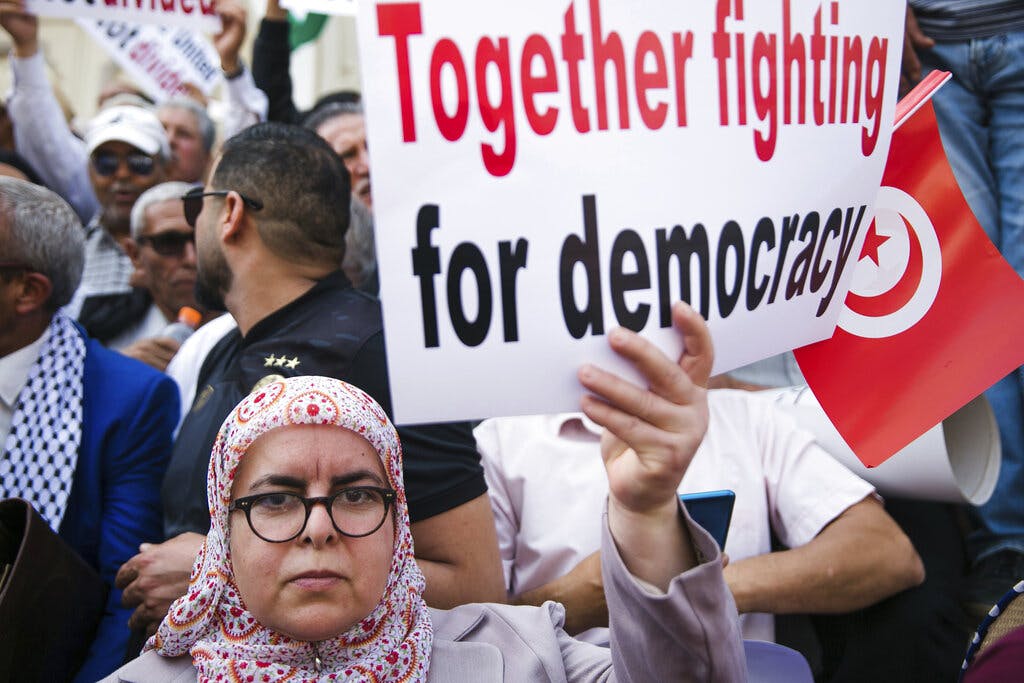So Much for the Arab Spring’s Last Hope: Tunisia on Verge of Full Autocracy
The man who wrote the first draft of the country’s proposed new constitution, Sadeq Belaid, is no longer backing it, warning it would ‘pave the way for a dictatorial regime.’

While the idealism of the Arab Spring for the most part has long faded, Tunisia has been seen as an exception. Now even that country’s stint as a near-democracy is about to end with a return to full autocracy, as the president, Kais Saied, has consolidated all powers in his hands.
Tunisia’s main opposition leader, Rached Ghannouchi, is about to face trial on unspecified corruption charges, according to his party, Ennahada. Mr. Ghannouchi’s bank accounts were frozen earlier this week in a move that is widely seen as part of Mr. Saied’s drive to remove all opponents from power positions.
On July 25 of last year, the president dissolved the parliament, where Mr. Ghannouchi served as speaker, and soon afterward he also took over the independent judiciary. On this year’s anniversary of his coup, Mr. Saied plans to present a new constitution for a public referendum.
“The new Constitution sets the foundation of a theocratic Islamic state under the full control of the President,” a PhD candidate at Syracuse university who closely follows Tunisia, Mohamed-Dhia Hammami, tweeted.
If passed, Mr. Saied’s new writ would replace Tunisia’s 2014 constitution, which is widely seen as a unique document in the Arab world. Many outside observers, as well as Tunisians, saw it as a precursor to an era of democratic changes in the Mideast and North Africa.
If enacted, the proposed new constitution would dash such hopes. On Sunday the man who wrote the first draft of the document, Sadeq Belaid, announced he no longer backs it. Warning it would “pave the way for a dictatorial regime,” he said it is “completely different” from the document he had initially worked on.
The new writ would weaken the legislative and judicial branches, allow the president to fire members of the other branches, and give him the ability to unilaterally extend his own term. It would give him emergency powers that resemble those of the country’s overthrown dictator.
While the first draft had no mention of Islam, the current proposed constitution states in Article 5 that Tunisia is “part of the Islamic ummah,” or nation. It instructs the state “to work to achieve the objectives of pure Islam” on matters of life, honor, money, religion, and freedom.
The opposition, led by the Ennahda party, has called on supporters to boycott the July 25 referendum. So did the country’s powerful trade unions and other major political players who see it as a throwback to the era of Tunisia’s long-time dictatorial president, Zine El Abidine Ben Ali — the first Arab leader to be overthrown in the turmoil of the last decade.
In December 2010 a Tunisian fruit merchant, Mohamed Bouzizi, set himself on fire — and lit up the entire Arab world. Autocratic rulers who had used strong-arm tactics to maintain their holds on power were soon overthrown by angry crowds demanding more public say in policy-making.
Dubbed the “Arab Spring,” that revolt soon turned into long-simmering civil wars, as seen in Syria or Yemen. Egypt’s tyrant, Hosni Mubarak, was replaced with an Islamist, Mohamad Morsi, whose inept, short-lived rule took the county downward. Egyptians, at least initially, welcomed President al-Sisi’s return to dictatorship.
Tunisia, where it all began, was different. An Islamist party that had been banned under Ben Ali, Ennahda, assumed power. The party and its leader, Mr. Ghannouchi, dominated Tunis’s politics despite the country’s long secular traditions.
While Ennahda was initially tied to the Muslim Brotherhood, it is “a different kind of Islamic party,” a Hebrew University professor specializing in North Africa studies, Daniel Zisenwine, told the Sun. The party, he said, has stuck to democratic principles, and modeled itself as a “right of center, socially conservative party inspired by Europe’s Christian Democrats.”
In the October 2019 presidential election, Ennahda backed Mr. Saied, a then relatively unknown former law professor who ran as a populist and won the election with more than 70 percent of the vote. By that time, “there was a growing disillusionment with the political class, which remained out of touch” with the public, Mr. Zisenwine says.
With political paralysis and an economic downturn, Tunisia, a unique country in modern Arab history, is now fast rejoining the stagnate politics of the rest of the region.
The country’s first president following independence, Habib Bourguiba, enacted reforms that were unheard of at the time. In the early 1960s he also bucked the region’s poisonous anti-Israelism and antisemitism, calling for a rapproachment with the Jewish state.
During the Bourguiba and Ben Ali eras, Tunisia’s secularism and its beautiful beaches kept it on the map of sophisticated travelers. Perhaps as a reaction against Ben Ali’s forced secularism, Islamic garb now dominates the beaches, and Muslim-oriented politicians dominate Tunis.
In the 1990s Ben Ali maintained low-level ties with Israel, Mr. Zisenwine says. Not now. In 2019, when several Arab countries started to normalize ties with Israel in the leadup to the Abraham Accords, Mr. Saied was asked whether Tunisia would join them. “Normalization is the wrong word to use,” he retorted, “we should be talking about high treason.”

